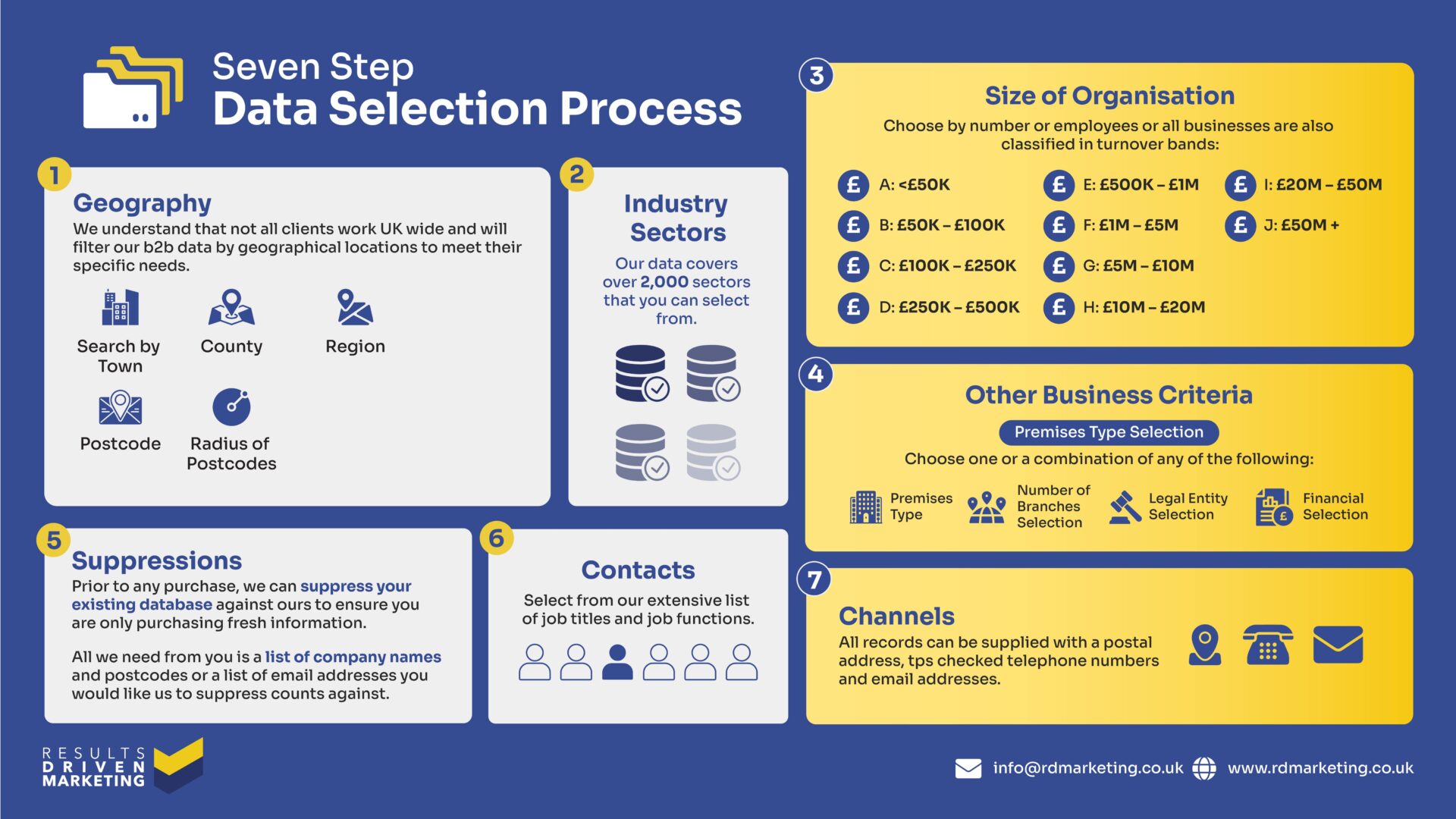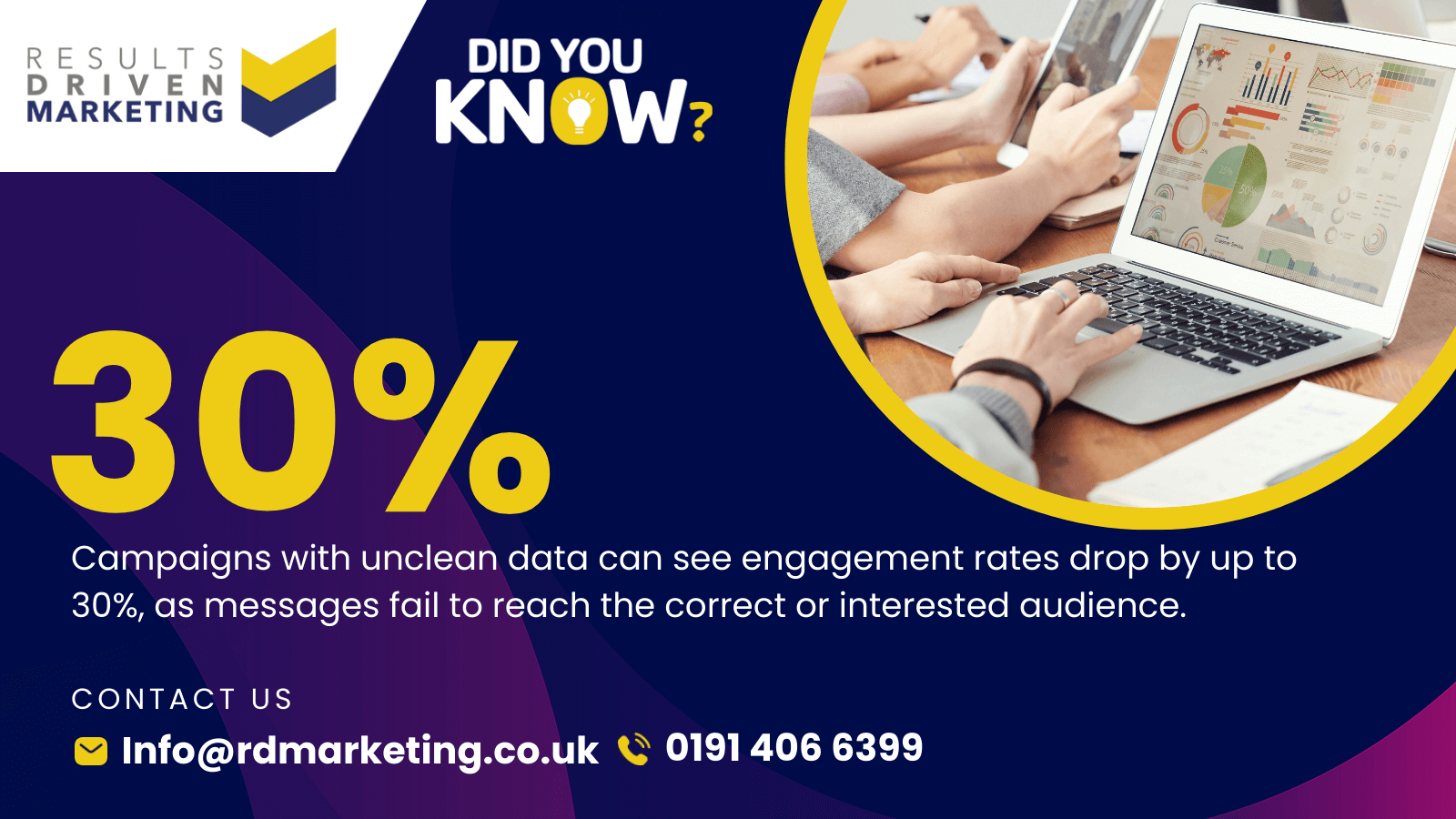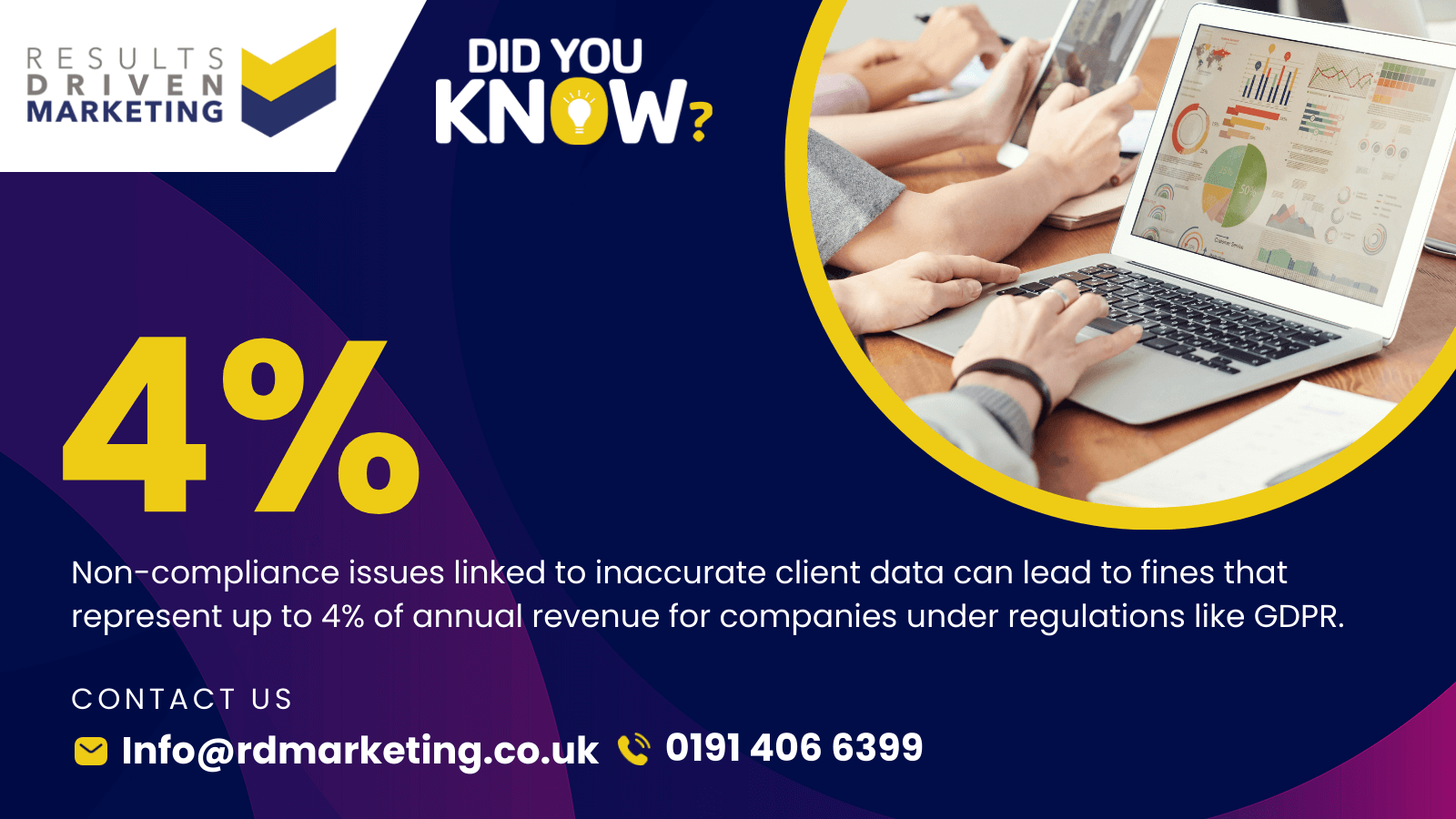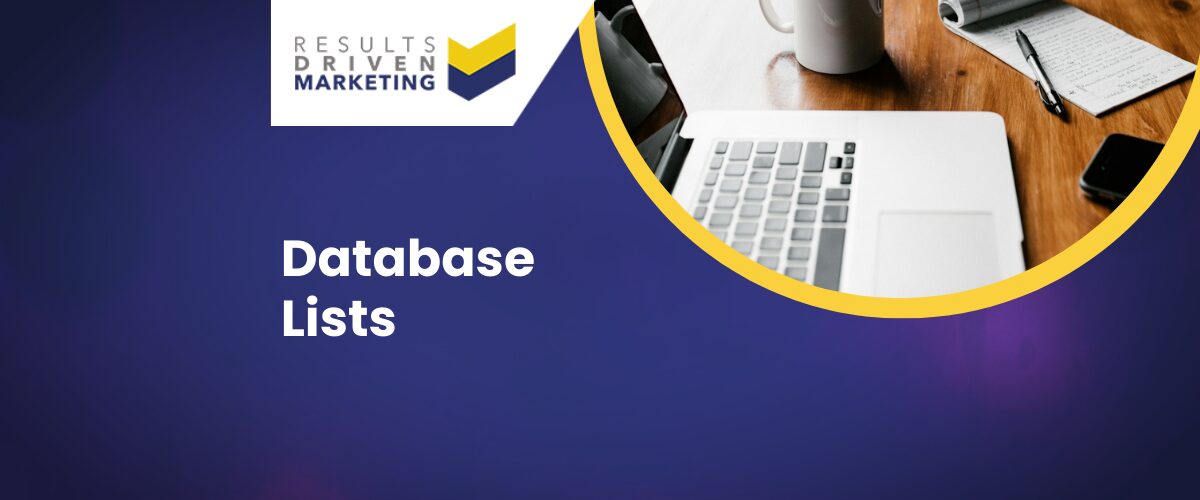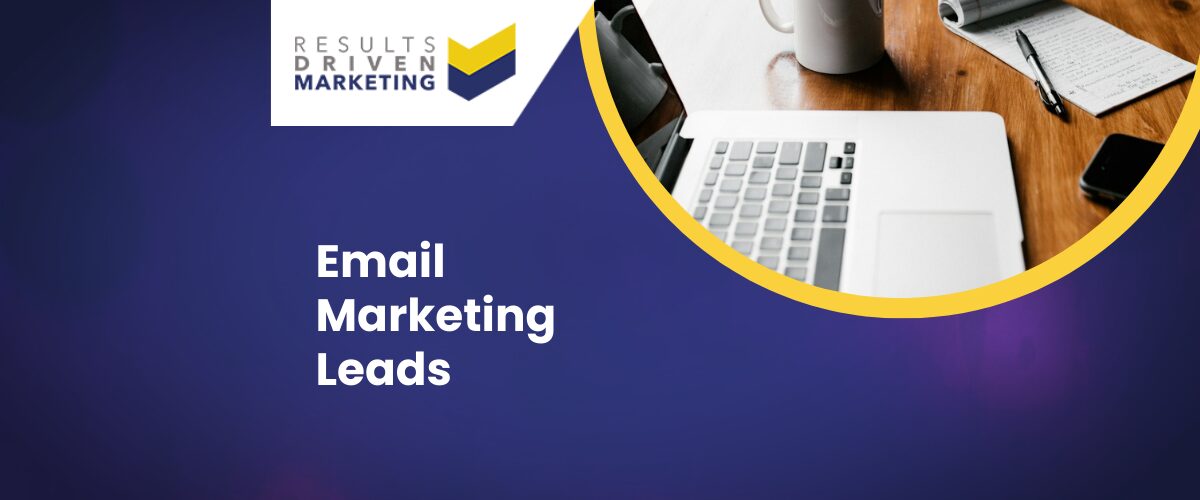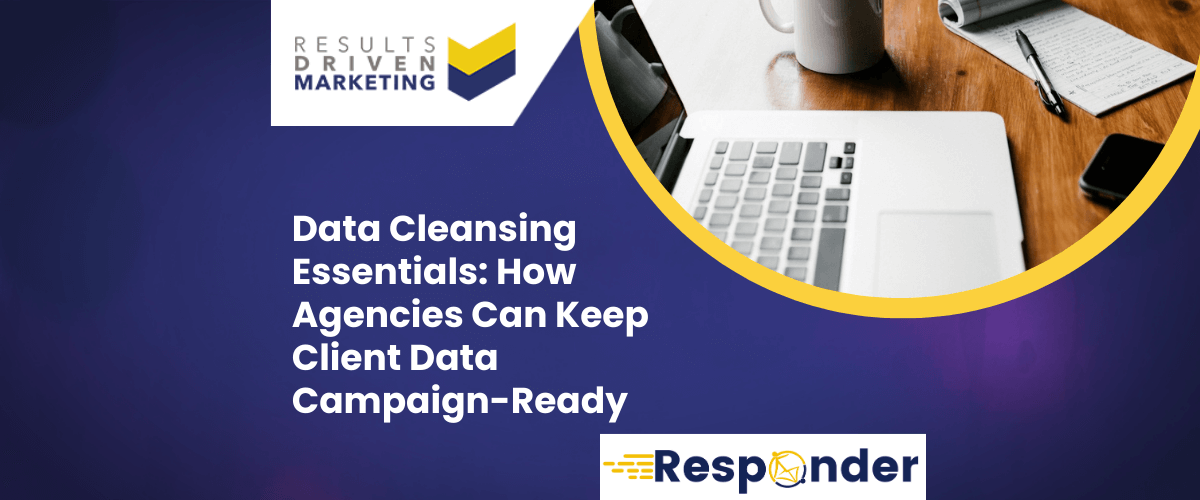
Data Cleansing Essentials: How Agencies Can Keep Client Data Campaign-Ready
Having quality client data is absolutely crucial for campaign success. Every email sent, direct mail piece delivered, or telemarketing call made relies on client data that’s up-to-date, accurate, and targeted.
But as time goes by, data inevitably decays—details get outdated, duplicates start piling up, and inconsistencies sneak in.
This decay doesn’t just clutter your database; it wastes marketing resources, reduces engagement, and can leave both clients and agencies feeling frustrated.
That’s where data cleansing comes into play. Data cleansing is the systematic process of reviewing, refining, and correcting client data to ensure it’s fresh, relevant, and campaign-ready.
It helps eliminate inaccuracies, remove redundancies, and, critically, align the data with compliance standards. For agencies, these improvements aren’t just nice-to-haves—they’re essential for keeping client data effective in reaching and engaging target audiences.
As client data continues to be central to marketing success, it’s more critical than ever to prioritise data hygiene.
Regularly cleansing client data can transform campaigns from average to impactful while protecting against compliance risks and inefficiencies.
Agencies looking for specialised B2B Data or Email Marketing Management Services should consider leveraging these services to maintain clean and compliant data for their client campaigns.
Table of contents:
Why Data Cleansing is Essential for Client Data
In any marketing campaign, the quality of client data can make or break results. Ensuring that data is not only accurate but also relevant is paramount to maximising campaign performance, minimising wasted resources, and preserving the reputation of both the agency and its clients.
Without proper data cleansing, the risk of misdirected messaging, diminished ROI, and even legal repercussions rises significantly.
The True Cost of Dirty Data
Imagine launching a campaign only to find that a large portion of your client data is outdated, incorrect, or duplicated. These data issues don’t just hinder a campaign—they drain resources.
In fact, studies indicate that nearly 25% of email databases naturally decay each year, with addresses becoming obsolete or clients switching roles.
For agencies, this means that unclean client data translates directly into reduced engagement, lower deliverability rates, and wasted marketing dollars.
Here’s a closer look at the consequences of working with “dirty data”:
Wasted Resources: Resources dedicated to managing and launching campaigns with poor client data are essentially squandered. Teams spend time preparing content that may never reach the intended audience, and budgets are exhausted on ad placements that fail to convert due to low relevance.
RD Marketing’s Direct Mail Data and Telemarketing Data services offer clean and targeted data that minimise these losses.
Reduced ROI: Dirty client data can cut campaign ROI by as much as 30%. When emails bounce or go unread because of inaccurate data, campaigns yield fewer results, driving up the cost per acquisition (CPA) and reducing the effectiveness of marketing dollars spent.
Lower Engagement Rates: Using outdated or inaccurate client data often means reaching out to the wrong people, which in turn results in lower open and click-through rates.
High bounce rates caused by invalid email addresses or phone numbers can also damage sender reputation, ultimately making it harder for future campaigns to reach inboxes. By using our Email Address List Data and regularly cleansing contact lists, agencies can keep their sender reputation intact.
These risks emphasise why investing in quality client data and regular data cleansing services is essential. RD Marketing’s Data Cleansing Services help agencies maintain data integrity, ensuring that campaigns are always backed by accurate, actionable data.
Compliance and Reputation Management
When it comes to meeting these regulatory standards, data cleansing plays a vital role:
- Adherence to Regulations: Regularly cleansing client data ensures that every contact is valid and meets compliance standards. This includes checking each record against suppression lists and consent requirements. Tools like RD Marketing’s CTPS Checker are indispensable for validating compliance with requirements, such as those in the UK’s Corporate Telephone Preference Service (CTPS).
- Protecting Brand Image: Outreach to clients who have not consented to communication can lead to complaints and even brand backlash. Clean client data keeps campaigns on the right side of regulation, ensuring that messages only reach those who are open to receiving them.
- Enhanced Security: Data cleansing helps agencies track and validate information while removing redundant or incorrect entries, creating a more secure and streamlined dataset that reduces the risk of unauthorised data use.
As the need for compliant, reliable, and targeted client data grows, agencies must consider routine data cleansing not just as a campaign enhancement but as a necessity.
Leveraging services such as Data Enrichment and International Email List options from RD Marketing can help ensure client data remains compliant and effective for global reach.
Overall, consistent data hygiene is essential to preventing issues that compromise campaign performance, compliance, and brand reputation.
Investing in regular data cleansing and quality client data from reputable sources like RD Marketing’s Consumer Data and B2B Data solutions ensures that agencies and their clients can run smooth, targeted, and compliant campaigns.
Core Data Cleansing Steps for Agencies
Keeping client data accurate, up-to-date, and ready for campaigns requires a few essential steps.
Each one addresses a unique aspect of data quality, ensuring that client data is accurate, consistent, and fit for purpose. Here’s a breakdown of core data cleansing steps that every agency should implement regularly.
Step 1: Remove Duplicate Records
Duplicates can silently wreak havoc on your client data, inflating campaign costs and risking negative responses from over-contacted prospects. To ensure data quality, identify and remove these redundancies effectively.
Tips for Handling Duplicates in Client Data:
Use unique identifiers: Assign unique ID numbers to each client record, making it easier to spot and merge duplicate entries.
Automate de-duplication: Leverage tools that flag similar entries based on matching fields like email addresses, phone numbers, or customer IDs.
Cross-check across lists: Cross-referencing data from multiple sources (like email lists and telemarketing data) helps prevent duplicates from slipping through. RD Marketing’s Telemarketing Data can integrate seamlessly with other lists, allowing for easier identification and merging of client data.
Removing duplicates saves time and reduces costs, ensuring every campaign only reaches unique, interested prospects.
Step 2: Correct and Standardise Data Formats
Inconsistent data formats can lead to errors and misinterpretations, ultimately affecting campaign accuracy. Standardising formats across all client data ensures consistency, making data easier to process and analyse.
Tips for Standardising Client Data:
- Create a format template: Set standard formats for all fields, including phone numbers, addresses, and names. For instance, all phone numbers should follow the same country code and format (e.g., +1 (123) 456-7890).
- Use data validation tools: Tools like Excel or specialised data management software can automatically correct common formatting errors.
- Ensure cross-platform compatibility: Make sure that data formats align across platforms, such as when importing records from Email Address List Data to CRM systems.
Consistent formats make client data much easier to work with, improving segmentation and targeting accuracy.
Step 3: Validate and Enrich Contact Information
The accuracy of client data relies on precise contact details. By validating data fields and enriching records where necessary, agencies ensure their campaigns reach the right audience every time.
Validation helps identify inactive or incorrect contact details, while enrichment fills in any missing gaps to create a complete, actionable client profile.
Steps for Validating and Enriching Client Data:
Run verification checks: Confirm that emails, phone numbers, and addresses are up-to-date and operational. Using RD Marketing’s CTPS Checker is an effective way to verify phone numbers.
Enrich missing details: If key fields like job titles, company names, or geographic locations are missing, data enrichment services can fill these gaps. Data Enrichment Services from RD Marketing allow agencies to enhance their client data with precise, actionable information.
Implement automated validation: Automating these checks ensures consistent quality and prevents outdated information from clogging up your campaigns.
Keeping contact information accurate and complete means fewer bounces, higher deliverability rates, and more impactful outreach.
Step 4: Segment and Categorise Client Data
Segmentation is the heart of effective, personalised marketing. By categorising client data into relevant groups, agencies can target messages with far greater precision, increasing engagement and improving ROI.
Tips for Segmenting Client Data Effectively:
- Use demographic and behavioral data: Group client data based on characteristics such as age, location, industry, or past engagement. For example, RD Marketing’s Consumer Data offers a wealth of information for refining segments.
- Create engagement-based segments: Separate high-engagement contacts from low-engagement ones to tailor messaging accordingly.
- Regularly refine segments: Client needs and behaviors change over time. Update segments periodically to ensure they reflect the latest trends and preferences, whether you’re working with International Email Lists or B2B Data.
By segmenting client data, agencies create more personalised campaigns, driving higher response rates and building stronger client relationships.
Wrapping Up
These data cleansing steps form the foundation of effective client data management. Each one plays a unique role in preparing client data for marketing success.
And remember, whether you’re looking to improve data quality, enhance targeting, or ensure compliance, RD Marketing’s Data Cleansing Services and Email Marketing Management Services are here to support every step of the way.
Consistent data cleansing transforms client data from a basic list into a powerful tool for campaign excellence.
Tools and Techniques for Effective Data Cleansing
For agencies, maintaining high-quality client data is essential, and while manual reviews are a part of the process, they simply aren’t efficient enough for larger datasets.
Fortunately, numerous data cleansing tools are available to automate and streamline this process, making data management more accurate and less time-consuming.
Below, we explore some of the most effective software solutions, along with their advantages, limitations, and when it may be beneficial to consider outsourcing client data cleansing.
Popular Data Cleansing Software
Microsoft Excel
Excel remains one of the most commonly used tools for data management due to its accessibility and flexibility. Excel provides features like filters, pivot tables, and data validation tools to clean, standardise, and format client data.
While it’s ideal for smaller datasets, Excel can quickly become cumbersome for larger volumes of data.
Pros:
- Widely accessible and user-friendly
- Offers various built-in data cleaning functions (e.g., duplicates removal, text formatting)
- Affordable, especially for small agencies
Cons:
- Not ideal for handling very large datasets or complex data structures
- Requires manual setup and is prone to human error
For client data that doesn’t require high-volume processing, Excel can be a cost-effective option. However, agencies working with larger data sets, such as Direct Mail Data or B2B Data, may benefit from more advanced tools.
SQL Tools
SQL (Structured Query Language) is perfect for agencies that handle larger volumes of client data. S
QL-based tools can query databases efficiently, enabling teams to locate duplicates, filter records, and standardise data formats on a much larger scale. SQL’s automation features also reduce manual input, allowing for faster and more accurate data management.
Pros:
- Highly effective for large datasets and complex data sets
- Supports powerful automation for data cleansing tasks
- Customisable to meet specific data structuring needs
Cons:
- Requires technical expertise in SQL language
- Not ideal for smaller, straightforward datasets
SQL tools are excellent for agencies managing large, diverse client datasets across different channels, including International Email Lists or Telemarketing Data.
As well as….
Data Management Platforms (DMPs)
For a more comprehensive approach, data management platforms integrate data cleansing with other data optimisation tasks. DMPs like Talend, Informatica, and Microsoft Power BI support cleansing, enrichment, segmentation, and analytics in one place, providing agencies with a 360-degree view of their the data of the client.
These platforms automate data validation, de-duplication, and segmentation processes.
Pros:
- Highly scalable and suitable for large or complex datasets
- Centralised data management for easy tracking and analysis
- Supports data automation, saving time and reducing errors
Cons:
- Higher cost than simpler tools like Excel
- Requires training and may need technical support for full functionality
DMPs are best for agencies that rely on a continuous stream of the data of the client and need consistent data quality across multiple channels, like email, phone, and direct mail campaigns.
RD Marketing’s Data Cleansing Services can complement these tools, providing agencies with specialised support and ensuring that all the data of the client remains campaign-ready.
Automation in Data Cleansing
Automation is becoming increasingly vital in data cleansing, as it eliminates repetitive tasks, improves accuracy, and speeds up the entire process. Many platforms now offer automated tools for the data of the client cleansing, from automatic duplicate detection to real-time validation of email addresses.
For agencies that frequently use large Email Address List Data or Consumer Data, automated data cleansing can enhance productivity significantly.
Advantages of Automation in Data Cleansing:
- Time-saving: Automation reduces manual input, freeing up resources for strategic tasks.
- Consistency: Automated processes ensure that data is cleansed to a consistent standard every time.
- Error Reduction: By minimising manual handling, automation reduces the risk of errors in the data of the client.
When to Outsource Data Cleansing to a Professional Service
While in-house tools are useful, there are times when it’s more efficient to outsource data cleansing, especially when working with extensive or complex datasets.
Outsourcing to a professional data service provider like RD Marketing can be particularly beneficial when:
- Data is vast or diverse: When handling large datasets across multiple formats, such as B2B Data or segmented lists like International Email Lists, external expertise ensures accurate and thorough data cleansing.
- Compliance is critical: Professional services often have dedicated tools, like the CTPS Checker, that ensure data meets regulatory standards, reducing the risk of compliance issues.
- Data enrichment is required: If the dataset lacks key details, services like Data Enrichment can enhance client data quality, adding missing fields and making the data more actionable.
Ultimately, whether you choose in-house tools or opt for outsourced support, keeping client data clean is a necessary commitment.
Well-maintained data not only boosts campaign effectiveness but also minimises waste, maximises ROI, and strengthens agency-client relationships.
With the right tools and techniques, agencies can manage client data more effectively and deliver better campaign results.
Best Practices for Keeping Client Data Campaign-Ready
Maintaining high-quality data is not a one-time task; it’s a continual process. Adopting best practices for regular data management keeps data current, compliant, and campaign-ready.
Here’s a look at essential practices that every agency should consider to keep their client data performing at its best.
Create a Routine Data Cleansing Schedule
Regularly scheduled data cleansing is critical to ensure data remains accurate, relevant, and ready for use in campaigns.
By establishing a cleansing routine, agencies can catch and address issues like outdated contact information, duplicates, or unsubscribed users before they impact performance.
Why Scheduling Data Cleansing Matters:
- Data decay is inevitable: Client data naturally loses accuracy over time, with email addresses becoming obsolete or contact details changing. Regular cleansing, whether monthly, quarterly, or semi-annually, ensures that campaigns don’t suffer from poor targeting.
- Improves campaign ROI: Clean client data translates to better targeting, higher engagement, and ultimately, greater ROI.
Setting the Right Schedule:
- For frequent campaigns (like email marketing), monthly cleansing is ideal to keep the list fresh.
- For long-term projects (like direct mail campaigns), quarterly cleansing may be sufficient.
Partnering with a service provider, like RD Marketing, that offers specialised Data Cleansing Services, can help agencies establish and maintain an efficient cleansing routine.
Automate When Possible
Automation plays a vital role in keeping client data consistent and accurate, particularly when managing larger datasets.
Automating parts of the data cleansing process saves time and reduces human error, ensuring client data is maintained at a high standard.
Recommended Tools and Workflows for Automating Client Data Management:
CRM systems with built-in cleansing: Many customer relationship management systems offer automation features for tasks like duplicate detection, format standardisation, and real-time validation of client data.
Data validation tools: Tools like CTPS Checker allow for automated validation of client contact details, which is particularly useful for telemarketing or phone-based outreach.
Automated enrichment services: Automation also applies to data enrichment, where fields like job title or industry are updated without manual input. RD Marketing’s Data Enrichment Services can help agencies enrich client data efficiently.
By automating routine tasks, agencies can maintain high-quality data while freeing up resources for more strategic activities.
Continuous Monitoring and Quality Assurance
Quality assurance is essential in data management. Regular monitoring and quality checks on client data ensure it’s consistently accurate, relevant, and compliant with regulatory standards.
Before launching a campaign, agencies should run data checks to verify that everything is up-to-date and in line with best practices.
Tips for Continuous Monitoring and Quality Checks:
- Set up alerts for anomalies: Use tools that flag discrepancies, such as a sudden increase in duplicates or incorrect formatting.
- Review bounce rates and engagement metrics: High bounce rates may indicate outdated or invalid email addresses, suggesting it’s time for a thorough cleanse.
- Pre-campaign quality checks: Before any major campaign launch, conduct a full review of client data quality to ensure there are no errors that could impact deliverability or engagement. This is especially relevant for high-volume Email Address List Data or International Email Lists.
For agencies aiming to consistently deliver top-notch campaigns, continuous monitoring and quality assurance are non-negotiable.
RD Marketing supports these efforts with services like B2B Data and Direct Mail Data, helping ensure that all the data of the client is up-to-date, compliant, and optimised for campaign success.
These best practices provide a structured approach to managing client data, transforming it from a basic resource into a powerful tool for precision-targeted marketing.
Conclusion
Keeping client data clean, current, and campaign-ready is essential for any agency aiming to deliver effective and compliant marketing campaigns.
From removing duplicate records and standardising data formats to validating and enriching contact information, these steps ensure that every piece of client data is accurate, actionable, and aligned with the agency’s goals.
A commitment to data cleansing isn’t just a way to enhance campaign performance—it’s a strategic move that safeguards reputation, ensures regulatory compliance, and maximises the potential of each marketing outreach.
Incorporating best practices, such as setting a routine cleansing schedule and using automation where possible, enables agencies to manage client data more efficiently, reduce manual workloads, and improve campaign ROI.
Regular data monitoring and quality assurance checks ensure that every campaign, whether through Direct Mail Data or Email Address List Data, reaches the right audience with the right message.
For agencies ready to elevate their the data of the client management, RD Marketing offers a suite of specialised services tailored to keep data compliant, enriched, and precisely targeted.
From our CTPS Checker for telephone compliance to our comprehensive Data Cleansing Services, we provide solutions that support agencies every step of the way. And if you’re looking to expand your reach, our International Email Lists and Consumer Data can help you target global audiences effectively.
Who are we?
Thinking about “how do I buy data“?
Providing b2b database solutions is our passion.
Offering a consultancy service prior to purchase, our advisors always aim to supply a database that meets your specific marketing needs, exactly.
We also supply email marketing solutions with our email marketing platform and email automation software.
Results Driven Marketing have the best data of email lists for your networking solutions as well as direct mailing lists & telemarketing data in telemarketing lists
We provide data cleansing and data enrichment services to make sure you get the best data quality.
We provide email marketing lists and an international email list for your business needs.
At RDM We provide b2c data as we have connections with the best b2c data brokers.
A good quality b2b database is the heartbeat of any direct marketing campaign…
It makes sense to ensure you have access to the best!
Call us today on 0191 406 6399 to discuss your specific needs.
Results Driven Marketing
0191 406 6399


